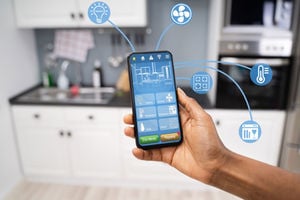
By automating appliances to switch off at designated times, he managed to halve his energy costs while maintaining a productive work environment. PHOTOS/UNSPLASH.COM
Larry Luyombya’s experience with smart home technology is a remarkable testament to its life-saving potential. During the pandemic, when he fell seriously ill and was unable to move, his automated home came to the rescue.
“I commanded the system to call for help. Because it was integrated with my phone, my address was already stored in the Smart Home platform. The ambulance was able to locate me, open the door, and take me to the hospital,” he recounts, illustrating the critical role technology can play in emergencies.
A passion for technology
Luyombya’s journey into the tech world began with dreams of becoming a doctor at the age of 10. However, during his time at Lubiri High School, he realised that biology and theoretical sciences were not his calling. Instead, he found his passion in electronics and technology.
After two semesters at Kyambogo University, he shifted gears and secured a scholarship in electronics science and technology at the University of Pune in India. He believed this would provide him with the hands-on experience he craved, a stark contrast to his previous academic environment.
Upon graduating, he landed a pivotal role as an electronics and embedded systems maintenance engineer at the Roads and Transport Authority in Dubai. There, he was tasked with designing an automated tolling system that would enhance efficiency and user experience in the region. This opportunity opened doors to his subsequent role at Google in Singapore as a Regional Data Centre Control Systems Engineer, which saw him travel extensively across Taiwan, Singapore, and Japan, further broadening his expertise and understanding of global tech landscapes.
Eventually, he transitioned to Toyota, where he took on the role of senior technical programme manager focusing on cyber and vehicle security, and later became a senior product manager.
Each of these experiences equipped him with invaluable skills and insights, preparing him for his ultimate ambition; to create a smart home ecosystem in Uganda.
Launching the companies
In light of his extensive experience and the growing demand for smart technology solutions, Luyombya founded the Larry Group of Companies. His mission is to integrate smart technology into homes and communities across Uganda.
He envisions not just smarter homes, but also smarter infrastructure, agriculture, and hospitality, fundamentally transforming the way Ugandans live and work.
“I want to make Uganda smart beyond just homes. Think of smart transportation systems, intelligent healthcare solutions, and agricultural innovations that can significantly drive digital transformation in the country,” he asserts. His ambition is not just to sell products but to build a technological ecosystem that empowers individuals and businesses alike.
Cultural adaptation
Luyombya's journey has not been without its challenges. Adapting to life in India involved navigating a new culture and cuisine, which included trying spicy red rice for the first time. He also faced the challenge of being a minority in a diverse society that had never seen many Africans, thus learning to thrive in this unfamiliar environment.
One of the most significant contrasts he experienced was in education. “In India, I found a deeply practical education system, contrasting sharply with the more theoretical approach I had experienced back home in Uganda,” he explains. The hands-on projects and innovative learning environment provided him with a strong technical foundation for his career. He advocates for a similar approach in Uganda, believing that the education system should be tailored to address the country’s specific challenges.
“With so much talent in Uganda, it is crucial that the education system prepares individuals to apply their knowledge practically, rather than merely in theory,” he stresses. His hope is that the next generation will be empowered to harness technology to solve Uganda's unique problems, fostering innovation that drives real development across various sectors.
Global citizen
Luyombya's experiences have spanned several countries, each with its own distinct culture. He notes, “India has a totally different culture from Uganda, as do Japan and Taiwan. Dubai was very metropolitan, with a lot of foreigners, and the culture is much more westernised. In contrast, Asian countries required me to adapt significantly.”
He recalls a humorous incident during a trip to Korea, where he was presented with a live octopus for dinner. “I had to eat it! Surprisingly, it turned out to be delicious,” he laughs.
Despite the challenges, Luyombya observed a prevalent scepticism towards Africans in global tech spaces, often encountering assumptions about his background based on his professional success.
“Colleagues sometimes assumed I was American simply because I led teams in prestigious international companies. Their attitudes would shift when I revealed I was from Uganda,” he reflects.
Yet he is adamant that Africa is no longer lagging behind in the tech revolution.
“Technology has levelled the playing field, giving Africans the chance to innovate, conduct research, and contribute to global advancements,” he says, expressing pride in the continent’s growing capabilities.

Larry Luyombya is a smart home technolgy entreprenuer
Smart home automation
Luyombya’s philosophy revolves around efficiency and productivity.
“I am a productivity freak. I love getting things done quickly and efficiently. If I can automate something, I will,” he explains.
Recognising the mundane nature of household chores, he integrated smart technology into his home life. He deployed two cleaning robots one for vacuuming and another for mopping to handle daily tasks, allowing him to focus on more important matters.
The convenience of automation extended to his lighting, curtains, and locks. As a frequent traveller, he found peace of mind in automated locks that allowed him to provide temporary access to cleaners without needing to leave physical keys.
“I would leave a pin for cleaners and receive notifications whenever they entered the house, even if I was out of the country,” he states.
Energy efficiency became another focus after he realised the significant energy consumption of his 65-inch television. By automating appliances to switch off at designated times, he managed to halve his energy costs while maintaining a productive work environment.
“I was shocked at how much energy I could save simply by being proactive about automation,” he adds.
A vision for the future
Luyombya’s vision for smart technology in Uganda goes beyond mere convenience; he sees it as a pathway to greater innovation across various sectors.
“Imagine smart healthcare systems that enable digital health records, streamlining processes so doctors can access a patient’s medical history with just a national ID,” he explains. In agriculture, smart solutions could allow farmers to monitor soil moisture levels and predict pest infestations, ultimately boosting productivity.
“I am eager to partner with existing smart companies and the government to push this agenda forward,” he states, highlighting the importance of collaboration in achieving widespread technological advancement.
Our homes are becoming smarter as both individual appliances and larger domestic infrastructure gain connectivity and processing power. These systems are being connected to each other and to the internet, as well as being integrated with voice interfaces such as Amazon’s Alexa, Apple’s Siri, and Hey Google, to create sophisticated home-automation schemes.
Who would have thought, ten years ago, that it would be possible to say “Movie night” and have your home’s doors and windows locked, curtains drawn, lights dimmed, room temperature set and TV turned on? But this is very achievable today.
Safety
As smart-home technology becomes more common and complicated, keeping it secure is becoming more important. One key part of security for Internet of Things (IoT) devices, including smart home gadgets, is making sure each device can prove it is real and not a fake. This involves giving each device a unique ID that is built into its hardware and cannot be changed or copied.
This unique ID helps establish trust between devices by verifying their identities. Once this trust is established, the devices can share a secret that allows them to communicate securely.
Another important security measure for smart-home devices is ensuring that any updates they receive are legitimate. This involves two steps. First, the source of the firmware updates needs to sign the code it sends, allowing the smart device to check that it’s from a trusted source. Second, the device must be able to confirm that the code has not been altered while it was being sent. If the signature is unrecognised or the code appears changed, the update should be rejected.
Secure communication is also crucial. This means using encryption methods that involve a device’s unique ID to protect data and user privacy. For example, sounds captured by a voice assistant need to be encrypted to keep them safe as they travel to cloud servers for processing. Video from security cameras must also be encrypted to protect privacy. Other devices that collect and send data, like thermostats and air-quality monitors, should be securely authenticated and use encryption to ensure that the data they send remains safe from tampering or misuse.
Smart homes can make our lives easier by automating many everyday tasks. However, we must be mindful of the security of the devices and networks that make this possible, as well as the privacy of the personal data these systems collect.
Confidence in making a difference
Luyombya believes that having the confidence to make a difference is crucial. “There is a level of responsibility that comes with saying, ‘If no one is doing it, I can do it.’ Believing in yourself is essential; if you do not believe in you, why should others?” he asserts.
He points out that the mindset of merely following what others do can hinder progress in Uganda.
“We need to cultivate a culture of innovation, where individuals feel empowered to explore their ideas and solutions,” he encourages.
The transformative power of technology
Reflecting on the impact of technology, Luyombya acknowledges its transformative power over the years.
“Now, there are no borders because of technology. Innovations such as AI have made the world more accessible. With tools such as ChatGPT, I can draft a business proposal in minutes, something that once took weeks,” he marvels.
As Luyombya continues to advocate for smart living in Uganda, his story underscores the profound benefits of technology capable of enhancing lives, fostering innovation, and addressing unique challenges in a rapidly changing world. Through his efforts, he hopes to inspire a new generation of Ugandans to embrace technology as a force for positive change.
By automating appliances to switch off at designated times, he managed to halve his energy costs while maintaining a productive work environment.
Our homes are becoming smarter as both individual appliances and larger domestic infrastructure gain connectivity and processing power.








